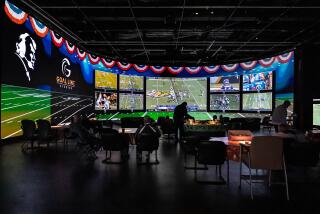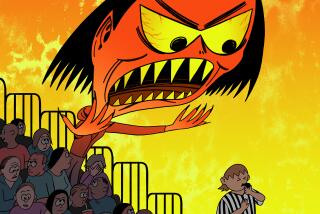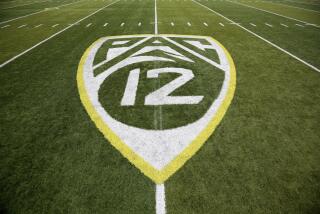Market Scene : All You Gotta Do Is . . . : Whistle for England’s J. Hudson & Co., top maker of the sports models.
- Share via
BIRMINGHAM, England — Shortly before the World Cup playoffs in America this summer, two senior soccer referees stopped by a quaint Edwardian factory in an industrial area here in Britain’s Second City.
England’s Philip Don and Holland’s Mario van der Ende were calling on the offices of J. Hudson & Co. to acquire a supply of new whistles--and not just any kind of whistle. They wanted the prince of whistles, the Acme Thunderer.
J. Hudson is the world’s premier manufacturer of sports whistles, fashioning different types for various sports--football, basketball, hockey, swimming--all of which need special sounds for varying acoustic conditions.
“The top referees like to pick their whistles personally,” said J. Hudson Managing Director Simon Topman, a descendant of founder Joseph Hudson, who created the firm in 1870. “We pride ourselves that referees pick our whistles not because of sponsorships but because they are the best and most reliable.
“When a really good soccer referee blows his whistle, he does it in such a way that the players know whether it’s just a minor foul or a major one that gets the cautionary yellow card--or the red one, you’re out.”
The Acme brand whistles are officially approved by about 200 sports bodies worldwide, covering 50 sports and recreational activities. Some refs carry a range of whistles to fit different venues, while others stick to their favorite model.
“You need a different whistle for the Super Bowl before 100,000 people than on a wet Saturday in Blackpool,” Topman explained.
J. Hudson also makes a wide range of other specialized whistles, nearly 5 million a year sold in more than 100 countries: bird and game calls, boat warnings, dog whistles, life-jacket whistles, boatswain’s pipes, musical whistles, personal-safety whistles, a survival model and the Scotland Yard police whistle, that tweeter made famous in Sherlock Holmes films.
Joseph Hudson, a toolmaker, started the firm to produce the Scotland Yard, or Metropolitan Police, model, figuring that if you built a better whistle, the world--or at least whistle-blowers--would beat a path to your door.
“The British police whistle was invented by our founder to replace police rattles current at the time,” Topman said. “It is a two-tone pipe made of brass plated in nickel. It was first tested in Hampstead Heath, London, and it could be heard a mile and a half away. This naturally was before walkie-talkies or cellular phones, when the only way of communicating with colleagues over that distance was by whistle. It was an important invention that is still used today.”
Indeed, in addition to police forces around the world, members of the British army and NATO military forces use similar cylindrical whistles.
“Our only competition is from the Far East with their cheap plastic imitations,” said Topman, 40, a chirpy bespectacled lawyer who joined the family company 12 years ago. “I get peeved because some makers of life jackets--which are very good indeed--will nevertheless use cheap whistles because they cost a few cents less, and which may never work in an emergency.”
Topman insists that Acme whistles have worked consistently since Hudson, after his success with the police whistle, invented the star of the line in 1885: the Acme Thunderer.
“He was looking to broaden the line and noticed that referees at sporting events used all kinds of makeshift whistles with inconsistent sound (and) unreliable performance,” Topman explained. “So he devised the standard-looking whistle, the Acme Thunderer, with a mouthpiece and barrel with a small ball of the finest-grain cork inside, (which) we call the pea.
“The pea inside the Thunderer interrupts the flow of air, producing a trilling effect, which can be modulated into a harsher or softer sound. So in the mouth of a top-class referee, it can be used like a musical instrument.”
Over the years, Acme developed other styles and mouth shapes in metal and plastic to suit individual preferences.
“You need different sounds from sport to sport,” the whistle maker said. “Basketball with its enclosed, indoor court needs a higher-pitched whistle, so we provide a pea-less instrument called the Tornado. But in a big football stadium like the Super Bowl, you need a lower frequency, because while you have bigger crowds, they are farther away from the players. That’s where our Acme Thunderer with the pea comes into its own.”
The managing director himself is clearly a whistle buff, and in the factory showroom he readily trills away on bird whistles. “You might say I whistle while I work,” he says, with an apologetic grin.
It is the specialty top end of the line, along with other specialized whistles and boat sirens, that adds to the company’s “handsome” profit, says Topman, because even the best Thunderers sell for less than $5.
“We have to sell a lot of Thunderers and Tornadoes to make a real profit,” says Topman, who employs a staff of 57. “As you might imagine, we are not crazy about golf, baseball, cricket and tennis. No whistles!”


